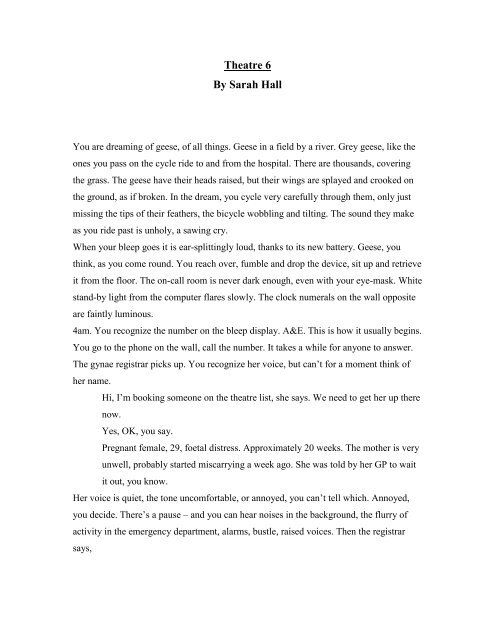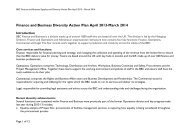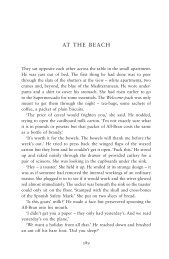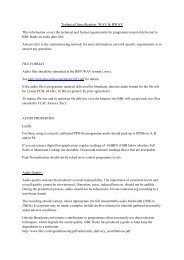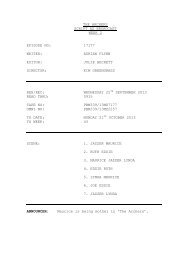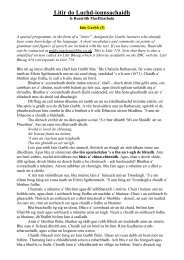Theatre Six transcript - BBC
Theatre Six transcript - BBC
Theatre Six transcript - BBC
You also want an ePaper? Increase the reach of your titles
YUMPU automatically turns print PDFs into web optimized ePapers that Google loves.
<strong>Theatre</strong> 6<br />
By Sarah Hall<br />
You are dreaming of geese, of all things. Geese in a field by a river. Grey geese, like the<br />
ones you pass on the cycle ride to and from the hospital. There are thousands, covering<br />
the grass. The geese have their heads raised, but their wings are splayed and crooked on<br />
the ground, as if broken. In the dream, you cycle very carefully through them, only just<br />
missing the tips of their feathers, the bicycle wobbling and tilting. The sound they make<br />
as you ride past is unholy, a sawing cry.<br />
When your bleep goes it is ear-splittingly loud, thanks to its new battery. Geese, you<br />
think, as you come round. You reach over, fumble and drop the device, sit up and retrieve<br />
it from the floor. The on-call room is never dark enough, even with your eye-mask. White<br />
stand-by light from the computer flares slowly. The clock numerals on the wall opposite<br />
are faintly luminous.<br />
4am. You recognize the number on the bleep display. A&E. This is how it usually begins.<br />
You go to the phone on the wall, call the number. It takes a while for anyone to answer.<br />
The gynae registrar picks up. You recognize her voice, but can’t for a moment think of<br />
her name.<br />
Hi, I’m booking someone on the theatre list, she says. We need to get her up there<br />
now.<br />
Yes, OK, you say.<br />
Pregnant female, 29, foetal distress. Approximately 20 weeks. The mother is very<br />
unwell, probably started miscarrying a week ago. She was told by her GP to wait<br />
it out, you know.<br />
Her voice is quiet, the tone uncomfortable, or annoyed, you can’t tell which. Annoyed,<br />
you decide. There’s a pause – and you can hear noises in the background, the flurry of<br />
activity in the emergency department, alarms, bustle, raised voices. Then the registrar<br />
says,
Blood pressure is a hundred over sixty, heart rate one thirty, temperature thirtynine,<br />
maintaining sats. We’re resuscitating. I’ve given her two litres of Hartmans,<br />
and Tazocin. She’s septic.<br />
The last filaments of sleep disperse, and now you are alert.<br />
She’ll need more, you say. What IV access have you got?<br />
I’ve got one eighteen gauge in the antecubital fossa. She’s quite difficult.<br />
I’ll come down, you say.<br />
Yep.<br />
The line goes dead.<br />
You bleep the Operating Department Practitioner, Karen, who rings back immediately.<br />
You tell her to get everything together - someone’s coming up.<br />
What have we got, she asks.<br />
Distressed pregnancy. 20 weeks.<br />
Right-o, she says. Want me to notify the night officer or ask for a recorder?<br />
You think for a moment. You have not yet seen the patient and the gynae registrar did not<br />
mention anything untoward. Karen is good, thorough, discreet. You’ve worked well<br />
together in the past.<br />
No, you say. Leave it. Who’s around up there?<br />
Robin. And Jim.<br />
Can you send Jim on a break?<br />
I’ll try.<br />
The walk to A&E takes five minutes. The corridors glimmer dully underfoot and are<br />
empty mostly; you pass a porter and a woman sweeping the floors, Cley and Winterton<br />
wards. You pass the chapel. The lights are low; the small electric candles and crucifix on<br />
the altar are always lit. Above the doorway a sign reads, Life Is Sacred. Sometimes you<br />
go into the chapel to sit, but not tonight. You focus on the forthcoming procedure. It will<br />
not be your decision, of course, the surgeon will prioritize, but you will be complicit – the<br />
entire team will be. Since the new legislation came in two years ago, the hospital has<br />
been fined several times, and a review is underway. You’ve already filled out several<br />
reports this year, and you’ve received a disciplinary letter, which, you are assured by
several of your consultants, is simply a formality and can be disregarded. Among some,<br />
such a letter is a badge of honour. You are uncomfortably aware, though, that in other<br />
hospitals medics have been charged and struck off; their names listed on the back pages<br />
of the journals. One or two have even been attacked in the street.<br />
You key in the code, push open the door of A&E and walk through the bays. There’s the<br />
usual racket and pace, machines beeping, staff in motion – managed disorder. A bloodyfaced<br />
drunk lolls on the edge of a gurney shouting obscenities. You wash your hands, ask<br />
a nurse where the theatre patient is and he gestures to a bed. The curtains are partially<br />
open but the woman is alone. Most of the staff seem to be attending a car crash victim at<br />
the far end of the room, where there is debris strewn on the floor, the residue of a shirt, a<br />
pair of cut-open jeans. The gynae reg has disappeared.<br />
The pregnant woman is lying on her side, deathly pale and sweating profusely; the<br />
mound under the gown is wet. She has a hand tucked across her lower abdomen. Her eyes<br />
are closed. There’s a receptacle next to her on the bed into which she has vomited. You<br />
check the pressure bag is pushing fluids and read her chart notes. She lifts her head and<br />
looks up at you.<br />
I’m Doctor Rosinski, you say. I’m the anaesthetist registrar. I’m going to put<br />
another cannula in you, before we take you to theatre, is that OK?<br />
With effort, the woman nods. Her head falls back on the pillow. You take gloves from a<br />
box on the wall, find a 16 gauge cannula. You torniquet, tap and brush the forearm, find<br />
the sephalic vein and swab the skin with a steri-wipe.<br />
Sharp scratch, you say.<br />
The needle slides in. She doesn’t flinch. She looks up at you. Her cheeks and chest are<br />
garishly flushed against the pallor.<br />
I don’t want - she whispers. Please, don’t let me -<br />
She is trembling and cannot say it. You can see fear in her eyes, under the disorientation<br />
of illness and shock, fear that used to be selfless, but is now for herself as well as for the<br />
baby. Such cases are common enough not to make the newspapers anymore.<br />
I know, you say, gently. It’ll be OK.<br />
You can’t really say more. What could you say? Our surgeons are excellent. Our<br />
maternal mortality rates are among the lowest in the country. We don’t all believe in the
Hunter foetal care plan. You finish cannulating. You take a blood culture and gas,<br />
complete the anaesthetic assessment, tape over her rings, then find a nurse and a porter to<br />
help wheel the bed. On the way to theatre the patient vomits again. The sheet underneath<br />
her is stained and her breathing has become more laboured.<br />
Don’t worry, the nurse says, daddy is on his way, I’m sure. And the baby will be<br />
just fine.<br />
Inane, soothing and a lie. Or perhaps the nurse is simply playing her part; it is hard to<br />
know sometimes. And you wonder - if everybody acts with duplicity, do they arrive at a<br />
kind of truth? But you say nothing, certainly not the obvious. That the patient is beyond<br />
such things now. That if the products of conception are not evacuated fast, the infection<br />
could become fatal. Products of conception is not a permitted term anymore. Nor, septic<br />
abortion. There is a new language, which must be written, if not spoken. Pre-birth crisis.<br />
Un-salvageable uterine life. You’ve seen this level of disintervention before - the<br />
extraordinary bleeding and blossoming of bacteria, which amounts to neglect. God’s<br />
Jurisdiction, is how the prime minister described it in his speech to parliament. He is a<br />
great orator, they say, the best for decades.<br />
The woman is crying softly. You would like to give her something more, ketamine,<br />
temazepam, but the options have been limited. If on the drug chart it appears you are<br />
disregarding the baby’s health, even at this stage, it will look bad. At the lifts you thank<br />
the nurse and say you and the porter can manage the rest of the way. The nurse smiles,<br />
reaches into her pocket and takes out a small silver disc, on which there is an embossed<br />
angel. You’ve seen these items on sale in the hospital gift shop – 20 pence each – they’re<br />
found all over the wards and in the chapel’s votive plates. The nurse presses the icon into<br />
the hand of the patient.<br />
Thank you, you say. I’ll have to take it off her before surgery, but I’ll put it<br />
somewhere safe.<br />
You press the button and the lift doors close.<br />
In the Anaesthetics Room Karen has thoughtfully brought you a cup of tea. It’s<br />
lukewarm. There’s no time - you take two sips and bin it. You wash your hands. You and<br />
Karen transfer the patient to the table. You check the ID band again, position her head
and neck so she is taking the morning air. You give her 100% oxygen, push the milky<br />
hypnotic, and paralyze. After sixty seconds you remove the mask, Karen hands you the<br />
laryngoscope, you view the chords, and intubate. You scrub your arms, to the elbow. You<br />
place a central line as swiftly and smoothly as you ever have. Then you wheel her into<br />
theatre 6, and attach her to the ventilator. They are all waiting, masked and gowned. The<br />
gynae reg has scrubbed in; she nods to you. Dr. Malhotra - now you remember her name.<br />
She was there last year, during the Hannah Lehrer surgery, which is now the Hannah<br />
Lehrer case. You do not recognize the consultant. He introduces himself.<br />
Hello. I’m Mr. Desai.<br />
You introduce yourself, Karen and the support worker do the same, the nurses. The<br />
W.H.O. checklist is repeated. You adjust the table upwards, and the patient is positioned.<br />
Are we without a night officer? the surgeon asks.<br />
I believe so, you say.<br />
You catch Karen’s eye for the briefest moment before she looks away.<br />
And are we recording?<br />
No. Our tech is on a break.<br />
OK then, let’s get going, Mr Desai says; his tone light, almost song-ish.<br />
He steps towards the table.<br />
May I have your permission to disinfect? he asks, peering at you above his glasses<br />
and mask.<br />
He is politer than most consultants, the politeness of absolute confidence, perhaps.<br />
Drapes are being placed around the patient.<br />
Please go ahead, you say.<br />
As the surgeon sterilizes, he glances at you again and says,<br />
It’s a nice bike.<br />
Excuse me, you reply, thinking you’ve misheard.<br />
Your peloton. It’s a nice bike. I used to have one. I saw you putting it into the<br />
rack yesterday evening.<br />
Oh, right.<br />
Cycle in every day? he asks.<br />
Yes, you say. Most days. I live in Chesterton.
Ah, good for you. I would, but I live too far out now. My wife likes to be in the<br />
countryside. Which way do you come in?<br />
Along the river, you say. Past the crem.<br />
Ah, beautiful, he says. Yes, that’s the best way to come. Of course.<br />
He then asks, as courteously, for permission to begin. There are no ciphers and codes, by<br />
which to discuss politics or protocol, perhaps these things are discussed without you<br />
realizing it, perhaps you even discuss them without realizing it. There are times work<br />
feels normal, and moments so unreal you might be dreaming. You monitor the<br />
anaesthetic machine, push intravenous antibiotics. Four litres of fluid. You start colloids,<br />
administer little boluses of metaraminol. The surgeon evacuates quickly, pronounces its<br />
time of death and notes its sex, which is a legal requirement. The drapes are soaked, dark.<br />
The patient’s legs are lowered. Her blood pressure drops to sixty over thirty and sticks<br />
there – you have a sweaty few minutes getting it back up. You give her more fluids,<br />
noradrenalin, and begin a blood transfusion.<br />
She’s not enjoying this at all, you say.<br />
A laparotomy kit is brought forward. The initial cut is vast. The surgeon and registrar<br />
converse calmly as they operate. They attempt to save, and then remove the woman’s<br />
uterus. Finally, Mr Desai steps back, and Dr Malhotra closes, as carefully as stitching the<br />
hem of a wedding gown.<br />
You and Karen wheel the patient into recovery. She is extremely pale, but alive. She is<br />
lucky, though under what order of providence you could not say. The anaesthetist for the<br />
next shift arrives and begins the hand-over. You tell him about the night’s procedure.<br />
Glad I missed that hot potato, he says. Another letter, right?<br />
You shrug. You pass on the theatre list for the day – a ureteric stent, a bowel obstruction,<br />
revision of breast augmentation, nothing complicated. You are supposed to complete the<br />
requisite paperwork immediately and file a report to the Department for the Protection of<br />
Unborn Children, but instead you change out of your scrubs, go to the bike racks and<br />
head home. You’ve done your duty; enough.<br />
The morning is clear, a few high clouds banking on the horizon. Dawn has come and<br />
gone, but it still feels fresh and damp and clean. You cycle through the hospital grounds,<br />
past the crematorium and across a small park, then along the river. The field is empty.
The grass glistens under the wheels of your bike. When you look up there is a long dark<br />
vee of birds in the sky, moving ahead, slowly.<br />
Sarah Hall


